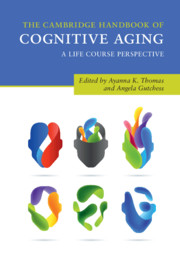Book contents
- The Cambridge Handbook of Cognitive Aging
- The Cambridge Handbook of Cognitive Aging
- Copyright page
- Contents
- Figures
- Tables
- Contributors
- Introduction
- Part I Models of Cognitive Aging
- Part II Mechanisms of Cognitive Aging
- Part III Aging in a Socioemotional Context
- Part IV Cognitive, Social, and Biological Factors across the Lifespan
- 23 Prenatal Influences on Cognitive Aging
- 24 Associations between Activity Participation across the Life Course and Cognitive Aging
- 25 Cognitive Aging and Culture: Older Brain Predictions about Different Environments
- 26 Current Perspectives on Aging and Bilingualism across the Life Span
- 27 Grit and Successful Aging
- 28 Control and Cognition: Contextual and Individual Differences in Cognitive Aging
- 29 Cognition and Well-Being across Adulthood and Old Age
- 30 The Genetics of Cognitive Abilities
- 31 Blood Biomarkers of Cognitive Health and Neurodegenerative Disease
- Part IV Summary: Early Life and Biological Factors
- Part V Later Life and Interventions
- Index
- Plate Section (PDF Only)
- References
24 - Associations between Activity Participation across the Life Course and Cognitive Aging
from Part IV - Cognitive, Social, and Biological Factors across the Lifespan
Published online by Cambridge University Press: 28 May 2020
- The Cambridge Handbook of Cognitive Aging
- The Cambridge Handbook of Cognitive Aging
- Copyright page
- Contents
- Figures
- Tables
- Contributors
- Introduction
- Part I Models of Cognitive Aging
- Part II Mechanisms of Cognitive Aging
- Part III Aging in a Socioemotional Context
- Part IV Cognitive, Social, and Biological Factors across the Lifespan
- 23 Prenatal Influences on Cognitive Aging
- 24 Associations between Activity Participation across the Life Course and Cognitive Aging
- 25 Cognitive Aging and Culture: Older Brain Predictions about Different Environments
- 26 Current Perspectives on Aging and Bilingualism across the Life Span
- 27 Grit and Successful Aging
- 28 Control and Cognition: Contextual and Individual Differences in Cognitive Aging
- 29 Cognition and Well-Being across Adulthood and Old Age
- 30 The Genetics of Cognitive Abilities
- 31 Blood Biomarkers of Cognitive Health and Neurodegenerative Disease
- Part IV Summary: Early Life and Biological Factors
- Part V Later Life and Interventions
- Index
- Plate Section (PDF Only)
- References
Summary
Participation in activities that provide opportunities for mental, physical, or social engagement have been supported as cognitively protective in later life. Theories propose how mentally stimulating activities might improve or maintain specific cognitive abilities across the life course or reduce age-related cognitive changes, for example, while physical activities might promote brain health via a reduction in cardiovascular risk profiles. Given that such lifestyles and behaviors are potentially modifiable, positive associations between activity participation and maintained cognitive abilities in old age highlight leisure-time pursuits as targets for intervention. However, associations between activity participation and cognitive aging may be prone to reverse causation: those with higher engagement across the life course might have always had higher levels of cognitive ability. Life course approaches are therefore needed to correctly identify the potentially beneficial effects of activity participation. In addition, given the growth and development of cognitive abilities across the life span, there may be specific types of activity or engagement that are beneficial at different points. Understanding the associations between mental, physical, and social activity participation and cognitive aging supports the development of interventions against age-related cognitive decline, ranging from targeted cognitive training programs to broader engagement-based approaches. An ultimate goal of research exploring activity participation and cognitive aging is to provide clear and accurate information to individuals regarding the steps they might take to promote brain health in later life.
Keywords
- Type
- Chapter
- Information
- The Cambridge Handbook of Cognitive AgingA Life Course Perspective, pp. 440 - 456Publisher: Cambridge University PressPrint publication year: 2020

